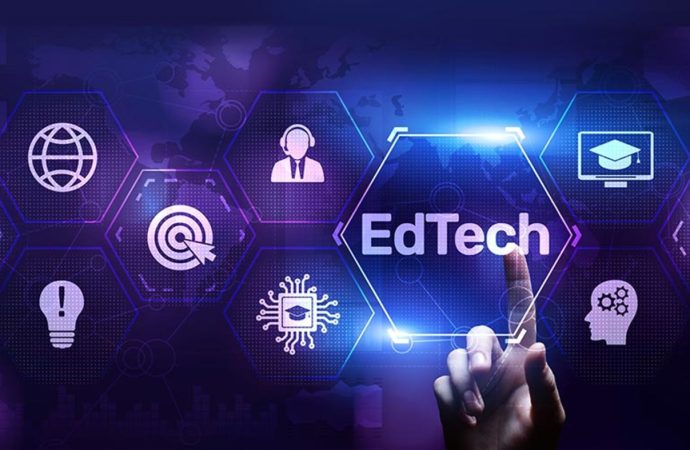The Education Technology (EdTech) sector has witnessed remarkable growth over the past decade, revolutionizing the way we learn, teach, and manage education. With advancements in artificial intelligence (AI), virtual reality (VR), mobile learning, and data analytics, EdTech is poised to continue transforming the global education system in 2025 and beyond. As this transformation accelerates, the
The Education Technology (EdTech) sector has witnessed remarkable growth over the past decade, revolutionizing the way we learn, teach, and manage education. With advancements in artificial intelligence (AI), virtual reality (VR), mobile learning, and data analytics, EdTech is poised to continue transforming the global education system in 2025 and beyond. As this transformation accelerates, the demand for skilled professionals in the EdTech field is higher than ever before. From instructional designers and software developers to product managers and data analysts, the variety of roles within EdTech is vast and growing.
In this article, we will explore the current job market in EdTech, the latest trends influencing employment opportunities, the key skills needed, and some real-world examples of how the industry is evolving. We will also highlight case studies and provide insights into how professionals can navigate the EdTech job market.
The Rise of EdTech: A Global Transformation

Image by Yandex.com
Over the last few years, education systems worldwide have undergone a fundamental shift, moving toward more digital and hybrid learning environments. The COVID-19 pandemic acted as a catalyst, pushing educational institutions to embrace remote learning at a scale previously unimagined. Although much of the world has returned to in-person classrooms, the digital tools and platforms developed during the pandemic have left a lasting impact, changing the future of education for the better.
EdTech is now a key player in providing equitable access to education, particularly in remote and underserved areas. The rise of MOOCs (Massive Open Online Courses), online tutoring platforms, and personalized learning technologies has paved the way for a more inclusive and flexible education system. This transformation is not just about technology; it’s about reshaping how knowledge is delivered and consumed.
Current Trends in the EdTech Job Market
1. Remote and Hybrid Work Opportunities
One of the most significant changes in the EdTech job market is the shift towards remote and hybrid roles. As remote learning became the norm during the pandemic, many EdTech companies discovered that remote work not only helped keep operations running but also improved flexibility and productivity. Today, many EdTech companies are offering fully remote positions or hybrid roles that allow employees to work from home part of the week.
For professionals in the field, this means increased job opportunities, especially for those based in regions with limited access to traditional education technology companies. Remote positions are available in various roles such as software development, instructional design, curriculum writing, marketing, and customer support.
2. AI and Machine Learning in Education
Artificial intelligence (AI) is one of the most transformative technologies in education today. AI-powered tools enable personalized learning by adapting the learning experience to the needs, strengths, and weaknesses of individual students. For example, platforms like Knewton and DreamBox use adaptive learning algorithms to adjust the difficulty of questions based on the student’s performance, helping them progress at their own pace.
As a result, there is a growing demand for professionals with expertise in machine learning, natural language processing, and AI-driven platforms. EdTech companies are hiring AI researchers, software engineers, data scientists, and AI developers to build intelligent learning tools that improve engagement and outcomes for students.
3. Augmented and Virtual Reality (AR/VR) in Education
Augmented Reality (AR) and Virtual Reality (VR) are increasingly being used to create immersive learning experiences. These technologies enable students to interact with 3D models, virtual simulations, and digital environments that mimic real-world scenarios. For instance, platforms like zSpace allow students to explore complex subjects such as biology and physics through virtual experiences that make learning more engaging and effective.
The growth of AR/VR in education has created a demand for professionals skilled in developing immersive content, 3D modeling, and interactive design. VR content developers, AR experience designers, and hardware specialists are now integral to the EdTech ecosystem.
4. Data Analytics and Learning Analytics

Image by Yandex.com
With the proliferation of digital learning tools, educational institutions and EdTech companies are collecting vast amounts of data on student performance, engagement, and outcomes. Learning analytics is the process of using this data to improve educational practices and make data-driven decisions. For example, platforms like Blackboard and Canvas offer detailed insights into student participation, assignment completion rates, and areas where students may need additional support.
Data analysts and learning analytics professionals are essential for analyzing this data to help educators personalize learning and improve student success rates. The ability to interpret and act on data is becoming a key skill for EdTech professionals, leading to an increase in demand for roles such as data analysts, data engineers, and business intelligence professionals.
Key Roles in the EdTech Sector
EdTech offers a wide variety of career paths, from technical roles to pedagogical positions. Here are some of the most sought-after jobs in the EdTech sector:
1. Instructional Designers
Instructional designers play a critical role in developing digital learning materials, online courses, and interactive educational content. Their job is to create effective learning experiences using best practices in pedagogy and instructional design, often utilizing Learning Management Systems (LMS) like Moodle, Canvas, or Blackboard.
These professionals typically have expertise in educational theory, learning outcomes, and multimedia content creation. Instructional designers must work closely with subject matter experts (SMEs) to create courses that are engaging and aligned with educational standards.
2. Software Engineers and Developers
The backbone of the EdTech industry is its technology, and software engineers and developers are at the heart of creating and maintaining this technology. These professionals build the platforms, apps, and tools that enable online learning, communication, and assessments.
Roles for software developers in EdTech often require proficiency in languages such as Python, JavaScript, Ruby, and Java, as well as experience with databases, cloud computing, and APIs. Full-stack developers, mobile app developers, and frontend/backend engineers are in high demand in the EdTech job market.
3. Product Managers
Product managers in EdTech work at the intersection of technology, education, and business. They are responsible for defining the vision and roadmap of educational products, ensuring that they meet the needs of students, teachers, and educational institutions. This role requires a blend of technical knowledge, educational expertise, and business acumen.
EdTech product managers collaborate with developers, designers, and stakeholders to prioritize features, design user-friendly interfaces, and ensure the product aligns with market demands.
4. Data Analysts and Learning Analysts

Image by Yandex.com
Data is a goldmine in EdTech, and data analysts are tasked with extracting meaningful insights from the massive amounts of information collected by educational platforms. These insights help improve teaching strategies, personalize learning, and assess student performance.
Learning analysts, on the other hand, specialize in analyzing data related to student learning behaviors, identifying trends, and providing recommendations to enhance learning outcomes.
5. Sales and Marketing Professionals
With the increasing competition in the EdTech industry, marketing and sales professionals are essential for helping companies expand their reach and communicate the value of their products. These roles often require an understanding of the education market, customer needs, and how technology can solve key educational challenges.
Sales and marketing professionals in EdTech must be able to effectively communicate complex technological solutions to educators, administrators, and parents, ensuring that the products are both accessible and impactful.
Skills and Qualifications Needed for EdTech Jobs
To succeed in the EdTech job market, professionals need a combination of technical skills, educational knowledge, and soft skills. Here are some of the most valuable skills for EdTech roles:
- Technical Skills: Proficiency in programming languages, web development, machine learning, and AR/VR content development is highly valuable in roles such as software development, AI, and immersive learning design.
- Pedagogical Knowledge: A solid understanding of educational theories, learning methodologies, and instructional design is essential, particularly for roles in curriculum development, instructional design, and learning analytics.
- Communication Skills: Clear communication is crucial for creating educational content, explaining complex topics, and collaborating with cross-functional teams.
- Project Management: Many EdTech roles require professionals to manage multiple projects simultaneously. Familiarity with project management tools like Trello, Jira, or Asana can be an asset.
- Problem-Solving and Critical Thinking: As the EdTech sector is constantly evolving, professionals must be adaptable and capable of solving complex challenges related to education, technology, and user experience.
Case Study: Duolingo – Personalizing Language Learning with Technology
Duolingo, a language learning app, provides an excellent example of how EdTech companies use technology to revolutionize learning experiences. The app utilizes gamified lessons, personalized feedback, and AI algorithms to help users learn languages at their own pace. Duolingo has grown to become one of the most popular language learning platforms, with millions of active users worldwide.
The company’s use of machine learning to personalize lessons and adapt to individual users’ learning styles is a prime example of how EdTech companies are using AI to improve educational outcomes. Duolingo’s success has created demand for roles in data science, machine learning engineering, and educational content development.
Conclusion: The Future of EdTech Jobs
As the EdTech sector continues to evolve, the demand for skilled professionals is only set to increase. From AI-driven learning tools to immersive VR environments, the future of education is increasingly shaped by technology. The job market in EdTech is diverse, offering opportunities for professionals with varying backgrounds, whether in software development, data analysis, instructional design, or marketing.
















